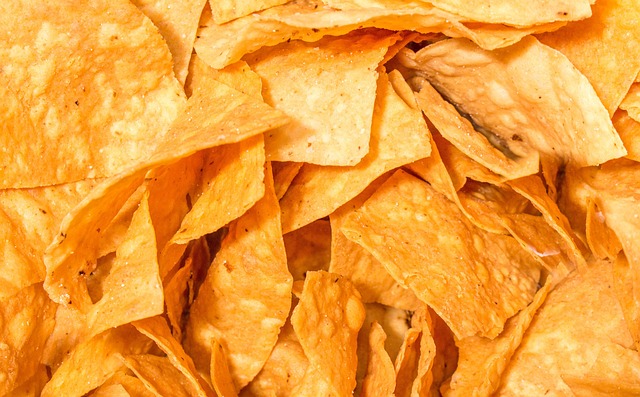In today's market, consumers increasingly demand transparent, natural food choices, particularly for snacks like tortilla chips. The "Non-GMO Tortilla Chips Mission" aims to provide high-quality, delicious chips without genetic modification, promoting sustainability and supporting small-scale farmers. Wrigley Field, home to the Chicago Cubs, stands out as a leader in this trend by offering 100% non-GMO tortilla chips, aligning with consumer demand for sustainable and healthy options. The growing popularity of these chips in baseball stadiums reflects a broader shift toward mission-driven, locally sourced food products, benefitting personal well-being and environmental conservation.
“Discover the crunchy delight that’s transforming baseball games and snacking habits alike—Crispy tortilla chips, a star attraction at Wrigley Field. This article delves into the rise of these beloved snacks, highlighting their non-GMO focus as a key component of sustainable and healthier choices. We explore Wrigley Field’s commitment to quality and their mission-driven practices, from sourcing local ingredients to promoting ethical production. Uncover the benefits of non-GMO tortilla chips for both health-conscious consumers and the environment.”
- Understanding Non-GMO Tortilla Chips: The Key to Sustainable Snacking
- Wrigley Field's Commitment to Quality: A Look at Their Snack Options
- The Rise of Crispy Tortilla Chips: A Favorite Among Baseball Fans
- Uncovering the Benefits of Non-GMO Ingredients for Health and Environment
- How Wrigley Field Incorporates Mission-Driven Practices in Their Products
- Exploring the Role of Local Sourcing in Creating Delicious, Ethical Snacks
Understanding Non-GMO Tortilla Chips: The Key to Sustainable Snacking

In today’s market, consumers are increasingly conscious of what they eat and where their food comes from. This awareness extends to snack foods like tortilla chips, leading many to seek out alternatives that align with their values. Non-GMO (non-genetically modified organism) tortilla chips are at the forefront of this trend, offering a sustainable and ethical snacking option. The mission behind Non-GMO Tortilla Chips is to provide delicious, high-quality snacks without relying on genetic modification, ensuring a healthier planet and its people.
By avoiding GMO ingredients, these chips contribute to a reduced environmental impact. GMO crops often require more pesticides and herbicides, leading to potential water contamination and biodiversity loss. Additionally, non-GMO farming supports small-scale farmers and promotes sustainable agricultural practices. When you choose Non-GMO Tortilla Chips, you’re not just snacking responsibly; you’re supporting a mission that prioritizes the long-term health of our planet and communities.
Wrigley Field's Commitment to Quality: A Look at Their Snack Options

Wrigley Field, home to the Chicago Cubs, is renowned for its rich history and passionate fan base. Beyond the iconic ballpark experience, the stadium has made a commitment to offering high-quality snacks, with a particular focus on their non-GMO tortilla chips. This dedication to excellence ensures that fans enjoy not just a game but also delicious and wholesome treats.
The stadium’s snack offerings highlight a meticulous approach to ingredient sourcing and preparation. Their tortilla chips, for instance, are crafted from 100% non-GMO corn, guaranteeing a healthier alternative for sports enthusiasts. This commitment extends beyond taste, as it aligns with the growing consumer demand for transparent and sustainable food options. Wrigley Field recognizes this trend and has embraced it, ensuring that their snack selection reflects modern preferences for natural, high-quality ingredients.
The Rise of Crispy Tortilla Chips: A Favorite Among Baseball Fans

In the world of baseball, where traditions abound, a new favorite has emerged—crispy tortilla chips. These golden, crunchy snacks have taken the stadium scene by storm, especially at iconic venues like Wrigley Field. The journey of non-GMO tortilla chips to becoming a fan favorite is a testament to their irresistible taste and versatility.
The rise of crispy tortilla chips can be attributed to a growing demand for healthier alternatives without compromising on flavor. The Mission to provide quality, natural ingredients has been embraced by baseball enthusiasts who now eagerly await the crackling addition to their game-day experiences. These chips offer a delightful contrast to the traditional soft snacks, providing a refreshing crunch that enhances the overall stadium experience, especially during those hot summer games at Wrigley Field.
Uncovering the Benefits of Non-GMO Ingredients for Health and Environment

In today’s market, consumers are increasingly conscious of their health and environmental impact, prompting a shift towards products with transparent, natural ingredients. This trend has significantly influenced food manufacturers, including those crafting tortilla chips like the ones found at Wrigley Field. By embracing a Non-GMO (Non-Genetically Modified Organism) tortilla chip mission, these companies offer consumers a healthier alternative while promoting sustainability.
Non-GMO ingredients have numerous benefits. They reduce potential risks associated with genetically modified foods, ensuring a more natural and organic product. Environmentally, they support sustainable farming practices by minimizing the use of pesticides and herbicides, thereby preserving ecosystems and biodiversity. Thus, opting for Non-GMO tortilla chips contributes to both personal well-being and environmental conservation, making it a wise choice for health-conscious and eco-aware folks.
How Wrigley Field Incorporates Mission-Driven Practices in Their Products

Wrigley Field, known for its iconic ballpark in Chicago, has embraced a commitment to sustainability and ethical practices, extending this philosophy to their food offerings as well. The stadium has introduced non-GMO tortilla chips as part of their mission to provide healthier alternatives while reducing environmental impact. By choosing non-genetically modified ingredients, Wrigley Field ensures that their tortilla chips are free from synthetic pesticides and herbicides, promoting a more sustainable farming practice.
This move aligns with the growing consumer demand for transparent, mission-driven food products. The stadium’s decision to incorporate non-GMO tortilla chips showcases its dedication to supporting local farmers and offering fans a guilt-free snack option. This simple change makes a significant impact, contributing to a greener and more responsible food industry, one crispy chip at a time.
Exploring the Role of Local Sourcing in Creating Delicious, Ethical Snacks

The journey towards creating delicious and ethical snacks involves a deeper exploration of local sourcing, particularly in the context of non-GMO tortilla chips. Wrigley Field, known for its rich history and passionate fan base, has embraced this concept by prioritizing locally sourced ingredients. By doing so, they ensure not only the freshest taste but also contribute to the support of nearby farmers and communities. This commitment aligns with the growing consumer demand for transparency in food production.
Non-GMO tortilla chips on offer at Wrigley Field stand as a testament to the power of local sourcing. These chips, crafted from carefully selected grains and vegetable oils, offer a healthier alternative without compromising on taste. The use of non-GMO ingredients not only promotes environmental sustainability but also guarantees a safer snack for consumers conscious about their dietary choices. This mission extends beyond the stadium walls, inspiring other food manufacturers to embrace local and ethical practices.
In conclusion, Wrigley Field’s commitment to quality and sustainable snacking is evident through their offering of non-GMO tortilla chips. By prioritizing mission-driven practices, local sourcing, and health benefits, they’ve created a favorite among baseball fans that contributes positively to both our plates and the planet. The rise of crispy tortilla chips, driven by consumer demand for ethical snacks, underscores the growing importance of understanding and supporting food choices that align with our values.
